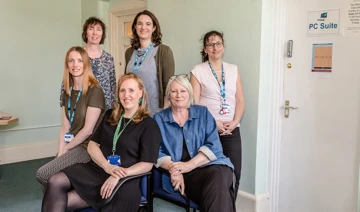NHS long term plan to tackle major killer conditions and save up to half a million lives
Date added: 07 January 2019

The NHS long term plan, published today, will save almost half a million more lives with practical action on major killer conditions and investment in world class, cutting edge treatments including genomic tests for every child with cancer.
The blueprint to make the NHS fit for the future will use the latest technology, such as digital GP consultations for all those who want them, coupled with early detection and a renewed focus on prevention to stop an estimated 85,000 premature deaths each year.
Measures outlined by NHS leaders today will help prevent 150,000 heart attacks, strokes and dementia cases while more than three million people will benefit from new and improved stroke, respiratory and cardiac services over the next decade.
Patients will benefit from services ranging from improved neonatal care for new parents and babies to life-changing stroke therapy and integrated support to keep older people out of hospital, living longer and more independent lives.
The NHS long term plan is also the first time in the NHS’ 70 year history when there will be a new guarantee that investment in primary, community and mental health care will grow faster than the growing overall NHS budget. This will fund a £4.5 billion new service model for the 21st century across England, where health bodies come together to provide better, joined up care in partnership with local government.
The commitment to tackle major physical conditions comes alongside the biggest ever investment in mental health services rising to at least £2.3 billion a year by 2023/24. Building on significant expansion in recent years, the long term plan will see around two million more people who suffer anxiety, depression or other problems receive help over the next decade including new dads as well as mums, and 24 hour access to crisis care via NHS 111.
The NHS long term plan will also:
- Open a digital ‘front door’ to the health service, allowing patients to be able to access health care at the touch of a button
- Provide genetic testing for a quarter of people with dangerously high inherited cholesterol, reaching around 30,000 people
- Give mental health help to 345,000 more children and young people through the expansion of community based services, including in schools
- Use cutting edge scans and technology, including the potential use of artificial intelligence, to help provide the best stroke care in Europe with over 100,000 more people each year accessing new, better services
- Invest in earlier detection and better treatment of respiratory conditions to prevent 80,000 hospital admissions and smart inhalers will be piloted so patients can easily monitor their condition, regardless of where they are
- Ensure every hospital with a major A&E department has ‘same day emergency care’ in place so that patients can be treated and discharged with the right package of support, without needing an overnight stay.
NHS England chief executive Simon Stevens said: “The NHS has been marking its 70th anniversary, and the national debate has rightly centred on three big truths. There’s been pride in our health service’s enduring success, and in the shared social commitment it represents. There’s been concern – about funding, staffing, increasing inequalities and pressures from a growing and ageing population. And there’s also been legitimate optimism – about the possibilities for continuing medical advance and better outcomes of care.
“In looking ahead to the Health Service’s 80th birthday, this NHS Long Term Plan acts on all three of these realities. It keeps all that’s good about our health service and its place in our national life. It tackles head-on the pressures our staff face. And it sets a practical, costed, phased route map for the NHS’s priorities for care quality and outcomes improvement for the decade ahead.”
Seventy years after the NHS was founded, the health service will expand care for patients and their families at every stage of life, supporting people to start well, live well and age well.
The NHS will be the first health service in the world to offer whole genome sequencing for children with cancer and young people who have a rare genetic disorder, in addition to adults suffering from certain rare conditions or specific cancers.
The new, individually tailored treatments will be introduced alongside cutting edge testing services that will mean three quarters of cancer patients are diagnosed early, when the condition is easier to treat, up from half at present, saving 55,000 lives a year.
Around 23,000 premature deaths and 50,000 hospital admissions will be prevented over the next decade by putting over 100,000 patients with heart problems through a healthy living and exercise programme every year.
Children and young people’s health will be a priority with the introduction of a new transformation programme to oversee delivery of commitments for the next ten years, from bringing mental and physical care together to services for 0-25 years so that care is timely and continuous.
A renewed focus on prevention including action to help people live healthier lives will stop thousands of people developing life threatening or limiting conditions, including the expansion of the Diabetes Prevention Programme.
And as more people live longer, care will increasingly be delivered in people’s homes or somewhere convenient, freeing up space in hospitals for those who need it most.
Ian Dalton, chief executive of NHS Improvement, said: “At the heart of the NHS are hard-working staff who pull out all the stops to care for patients every day. It is thanks to their dedication that the NHS is admired around the world and that it has taken great strides over the last seven decades.
“We need to build on these achievements and make the best use of the new investment to fundamentally reset how the NHS is run so that our growing and ageing population can get the right care at the right time and in the right place.
“This means breaking down organisational barriers to take a more holistic approach to how care is delivered and paid for, embracing new and existing forms of technology, recruiting and retaining the right number of staff, and shifting the focus away from hospitals to prevention and care in the community.
“Developed by those working within the NHS, the long term plan sets out an exciting roadmap for how we will do this together for the benefit of patients.”
Professor Carrie MacEwen, chair of the Academy of Medical Royal Colleges said: “It’s good to have a plan which sets a clear direction for the NHS and tackles many of the issues the Academy has long been saying need to be addressed if we are to improve patient care. Our challenge now is to make sure it’s properly implemented and in this regard we, that is everyone who works in the NHS and patients who use the service, must all play our part if we are to make it a success.”
Simon Gillespie, chief executive of the British Heart Foundation said: “This plan is a welcome and significant step in the fight against heart and circulatory diseases, which promises to save thousands of lives in the coming years.
“The plan’s strong focus on improving prevention and detection of heart and circulatory diseases and their risk factors has the potential to make a huge difference, ensuring that deaths rates fall further in the future. In addition, better care and support for people living with heart failure will significantly improve quality of life for many.
“It’s now essential that work gets underway on making this transformational plan a reality.”
Paul Farmer, chief executive of Mind, said: “We are really pleased to see that mental health is such a key focus in the NHS long term plan and we welcome the £2.3bn set aside for mental health services. This is the kind of sustained investment we need to see to put mental health on an equal footing with physical health and, if delivered, this plan will make a difference to the lives of thousands of people with mental health problems.
“Everyone now needs to work together to develop the workforce needed and to deliver these plans and to ensure the money reaches the frontline. Local decision makers need to develop their own plans and the proof of delivery will be in the experiences of people trying to access the services they need."
Lynda Thomas, chief executive of Macmillan, said:
“It's been a privilege to work with NHSE shaping the cancer section of the long term plan. I’m delighted that cancer has continued to remain a high priority. One in two people will get a cancer diagnosis during their lifetime and the plan lays out important milestones around improving survival and ensuring high quality personalised care for every patient. I look forward to continuing to work with the NHS to meet these milestones and to improve cancer care for patients now and in the future.”
Background information
- For all major conditions, results for patients are now measurably better than a decade ago. Childbirth is the safest it has ever been, cancer survival is at an all-time high, deaths from cardiovascular disease have halved since 1990, and male suicide is at a 31-year low.
- There is wide consensus about the changes now needed across the NHS. Patients’ groups, professional bodies and frontline NHS leaders have since July all helped shape this plan – through over 200 separate events, over 2,500 separate responses, through insights offered by 85,000 members of the public and from organisations representing over 3.5 million people.
- Work that kicked-off after the NHS Five Year Forward View is now beginning to bear fruit, providing practical experience of how to bring about the changes set out in this Plan. Almost everything in this Plan is already being implemented successfully somewhere in the NHS. These will now implemented right across the NHS.
- The Plan sets out how the 3.4% five year NHS funding settlement will help put the NHS back onto a sustainable financial path. In ensuring the affordability of the phased commitments in this Long Term Plan we have taken account of the current financial pressures across the NHS. We have also been realistic about inevitable continuing demand growth from our growing and aging population, increasing concern about areas of longstanding unmet need, the practical realities of phased workforce expansion, and the expanding frontiers of medical science and innovation
- Some improvements will be therefore be phased over the coming decade given the time needed to expand capacity and grow the workforce. So by 2028 the Plan commits to dramatically improving cancer survival, partly by increasing the proportion of cancers diagnosed early, from a half to three quarters. Other gains can happen sooner, such as halving maternity-related deaths by 2025. And some are now planned for next year and the year after, including action to relieve pressure on A&E



